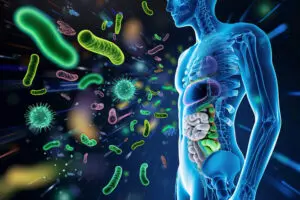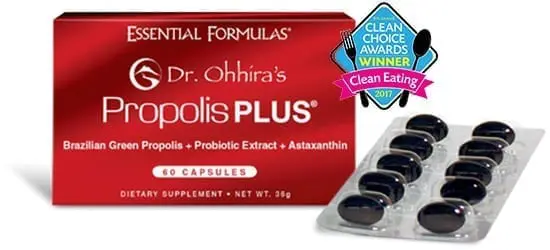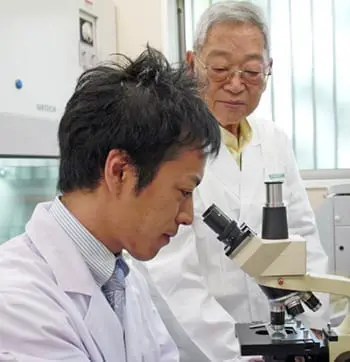
The primary site of action for probiotics is the gastrointestinal tract. Also, GI complaints such as diarrhea and/or constipation, gas, bloating, inflammation, pain and GI discomfort are symptoms that frequently cause people to use probiotics therapeutically. Therefore, improvement in these symptoms is a way people with GI complaints can judge if their probiotic is working. Also, the speed or rate of symptomatic relief is a measure of how well a probiotic is working.
Most people have experienced an occasional “bad hair day.” It is also common, and not particularly serious, to have an occasional “bad stool day.” However, if diarrhea or constipation are an ongoing problem, attempts should be made to correct the problem.
Numerous studies have been published in peer-reviewed scientific journals reporting that specific strains of probiotic bacteria can be used therapeutically to resolve conditions of diarrhea and/or constipation.
Therefore, how a well probiotic is working to resolve either diarrhea or constipation issues is an assessment of whether the individual’s bowel movements have normalized. Healthy stools should be well-formed, meaning not too hard and also, not loose and watery.
Interested in Probiotics?
Try Dr. Ohhira’s Probiotics or Dr. Ohhira’s Professional Formula to help with digestive health.
-
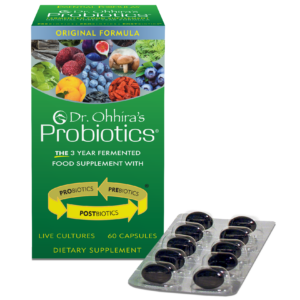 Dr. Ohhira’s® Probiotic Supplements$13.95 – $89.95
Dr. Ohhira’s® Probiotic Supplements$13.95 – $89.95 -
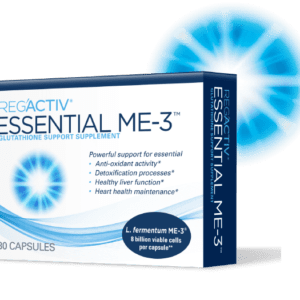 Reg´Activ Essential ME-3$39.95
Reg´Activ Essential ME-3$39.95 -
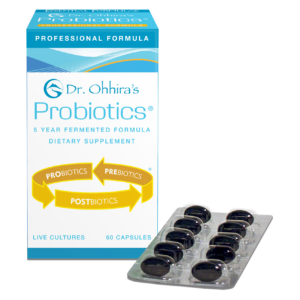 Dr. Ohhira’s® Probiotics Professional Formula$39.95 – $129.65
Dr. Ohhira’s® Probiotics Professional Formula$39.95 – $129.65
Probiotics and Gas
And now, to be blunt, foul smelling farts and excessive gas are also GI symptoms related to bacterial imbalance. Flatulence or passing gas is normal, everyone does it. However, horrible foul selling gas is a sign of a problem. Extensive intestinal gas can also cause abdominal bloating and in some cases, a great deal of discomfort. People frequently use probiotics to help resolve these problems.
When a probiotic supplement is used to treat these problems, how quickly these symptoms resolve is another way to measure the relative effectiveness of the product.
Food poisoning frequently causes nausea and vomiting, which are the body’s attempt to eliminate “bad” bacteria that have been ingested. Some probiotic products have been shown to be helpful in treating food poisoning when the probiotics are delivered directly into the stomach. It is easy to judge if the chosen probiotic is effective, based on if, or how quickly the nausea and vomiting stops.
Probiotics frequently also help improve or resolve problems that exist outside the intestinal tract such as acne, eczema and psoriasis. However, these conditions are much slower to respond. Also, probiotics are usually not used alone to treat these conditions, but are part of a larger integrated protocol that might include omega-3 fish oils, vitamin D along with dietary improvements and an attempt to identify and eliminate foods or other thinks in the person’s environment that are causing or contributing to these conditions.
Probiotics also play key roles in detoxification and regulation of the immune system. However, it is hard to accurately determine how well a probiotic is working to support detoxification and immune health. However, at Essential Formulas, we believe that taking high-quality probiotics regularly is an important proactive step that people can take to promote good health. So, if you are taking probiotics and you feel energetic and healthy….maybe the probiotics are helping.
Do probiotics make you fart or feel gassy?
While most people who take probiotics do so without encountering any negative side effects, some people DO experience a minor increase in flatulence. It’s just a byproduct of the GI tract undergoing changes and adjustments. The good news, though, is that, unless you have a sensitivity or allergy to one of the ingredients in the supplement, any increased gassiness should stop within a few weeks of consistent use.
Do probiotics make your poop stink?
No, though you may notice some other changes to your stool once you begin taking them! It’s not uncommon for probiotics to slightly alter the color or consistency of your poop, and some people report needing to poop more frequently at the beginning of their probiotic regimen. But increased stool odor is NOT associated with probiotic usage.
Do probiotics cause stinky gas?
No—in fact, many people who take probiotics notice that their farts actually becomes LESS pungent as time goes on. A new probiotic may cause more frequent flatulence at first, but the gas shouldn’t be any smellier than before.
A great place to begin a discussion about how probiotics work is by understanding what they are and why the health and wellness profession is so interested in them. Researchers find them so fascinating that more than 1,000 studies on the effects of probiotics on the human body are currently registered on the International Clinical Trials Registry Platform.
What Are Probiotics?
Probiotics are microbes that confer positive health effects on the host when introduced into the human body. These microbes are available naturally in certain fermented foods such as yogurt, sauerkraut, and miso. Naturally cultured beverages such as kefir, buttermilk, and kombucha also contain probiotics.
Probiotic supplements are an effective and convenient way to add probiotics to your diet. Make sure to choose a quality probiotic supplement like Dr. Ohhira’s that has multiple strains and is free from potential allergens, unwanted bacteria, chemicals, and pesticides.
Many different bacteria are considered probiotics, but most come from strains of three types of genera: Lactobacillus, Bifidobacterium, and a yeast called Saccharomyces boulardii.
The Probiotic Triad
There are three elements to think about when you take a probiotic. Let’s explore the probiotic triad and how each of the three elements work.
Probiotics
Probiotics are microorganisms that, when introduced into the body, grow and colonize, generating positive effects in the gut, and influencing many other body systems as well. The most-studied strains are Lactobacillus rhamnosus GG (LGG) and Bifidobacterium animalis ssp. lactis BB12.
Prebiotics
Prebiotics are the food probiotics consume and thrive on. These include foods that contain resistant starches, such as legumes, beans, green bananas, oats, tomatoes, and apples. These starches are “resistant” because they do not break down in your small intestine, but probiotics consume them in the large intestine if they are present.
Postbiotics
Postbiotics are the products of the probiotics’ actions in the body. Postbiotics include enzymes, vitamins, amino acids, and short-chain fatty acids that regulate inflammation and metabolism and help with multiple conditions. Most of the positive effects of probiotics on the body come from postbiotics.
What do Effective Probiotics Feel Like?
Probiotics effects usually begin in the gastrointestinal tract but influence systems throughout the body. People frequently use probiotics to help with complaints such as diarrhea, constipation, gas, bloating, inflammation, and abdominal discomfort. Improvement in these symptoms is a way to judge if the probiotic is working. Healthy stools should be well-formed and not too hard, loose, or watery.
Most people experience an occasional “bad stool day,” which is relatively common and not particularly serious. However, if diarrhea or constipation is an ongoing problem, seeing your medical practitioner and discussing whether probiotics could help is essential.
Numerous studies published in peer-reviewed scientific journals report that specific strains of probiotic bacteria can help with gut issues. Most studies report positive findings, but researchers have not isolated particular strains that improve specific conditions. Many research studies focus on gut issues, but without conclusive evidence, most recommend more research and using a probiotic containing multiple strains. Remember that Dr. Ohhira’s supplements contain 13 probiotic strains that help support different systems in the body.
Probiotics and Gas
Foul-smelling and excessive gas are GI symptoms related to bacterial imbalance. Flatulence or passing gas is normal; everyone does it. However, foul-smelling gas indicates a disturbance in the intestinal microflora. Copious intestinal gas can also cause abdominal bloating and, in some cases, discomfort. People frequently use probiotics to help resolve these problems.
When you use a probiotic supplement to treat these complaints, how quickly the symptoms resolve is another way to measure the relative effectiveness of the product. Many people report effects in a few days; others report improvements over weeks or months of consistent probiotic use.
Food Poisoning
Food poisoning frequently causes nausea and vomiting, stomachache, or fever, which are the body’s attempts to eliminate the harmful bacteria you have ingested.
An occasion of food poisoning can interrupt the microbial balance in your intestinal tract. Probiotics support a healthy microbiome and can help bring the gut back into balance, not only during the bout of food poisoning, but they may improve GI health so you are not as prone to food-borne upsets in the future.
If you take a probiotic to help with food poisoning, the time it takes to recover can indicate your probiotic’s effectiveness.
Beyond Improved Gut Health
Our microbiome is not only in our gut. It extends to the skin, urogenital tract, mouth, mucosa, and mammary glands. Studies have found probiotics helpful for other parts of the microbiome beyond the gut.
Probiotics you take for one condition may help improve the body’s general biome, so over time of regularly ingesting a quality probiotic, you may see improvements in other areas, such as the following:
- Gut health
- Attention, memory, thinking, and reasoning
- Mood
- Sleep
- Energy
- Stress levels
- Heart health
Here is a little more information about three crucial systems:
Skin
Your skin is part of your microbiome, so as you begin taking a probiotic supplement, you may find that some skin concerns improve. A bacteria called Staphylococcus aureus is associated with various skin issues. People with a healthy skin microbiome have a helpful bacterium that helps combat this and the 23 other bacterial strains that scientists have implicated in skin conditions.
Lifestyle changes and probiotic supplementation are critical for improving your skin microbiome. Here are some changes to consider:
- Maintain a healthy gut microbiome
- Eat a healthy diet
- Reduce sugar intake
- Understand any allergies or sensitivities that could be contributing to your skin issues
- Get enough omega-3 fatty acids
Immune System
Probiotics also may play a vital role in regulating the immune system. Several documented trials have found that ingesting certain probiotics “…may have significant effects on endpoints such as promoting the immune response, and reducing the incidence, duration, and severity . . . in children and adults.”
At Essential Formulas, we believe that regularly taking high-quality probiotics is an important proactive step you can take to improve your immune system and promote good health. So, if you begin taking probiotics and feel more energetic and healthier, it could be because of your probiotics.
Detoxification
Our modern lifestyle exposes us to chemicals and toxins our forebears did not have to battle. But can probiotics help offset the strains our bodies face as a result of a modern lifestyle? A 2022 study indicates that they can. It concluded that specific probiotic strains and combinations offer “significant health outcomes and positively impact…detoxification processes.”
Detoxification is difficult to measure without scientific tools. If you feel healthier and more energetic over time, you may be able to attribute it to your probiotic regimen.
Choosing a Quality Probiotic
The quality of the probiotic you take makes all the difference in your results. At Dr. Ohhira’s, we focus on quality above all. We use only the purest ingredients for our probiotics, and we culture thirteen different probiotic strains for three years before encapsulating them in a gel cap for your convenience.
The bacterial strains have three years to find out how to co-exist, the result being robust microorganisms that have the greatest chance of survival in your gut. Each capsule includes prebiotics that feed the organisms in the capsule and the helpful bacteria already existing in your body. After three years of growing in our pure, natural culture medium, the probiotics create postbiotics, so you realize their benefits quickly.
You deserve the well-being a quality probiotic can give you. Choose the best product, which we believe is Dr. Ohhira’s, maintain a consistent regimen, and enjoy your improved overall health and energy.
If you have any questions, we invite you to visit our website, which has many resources to help you learn more about how probiotics impact different body systems. We’d also love to hear from you. You can reach us online or call at 972-255-6648
FAQs
How Can You Tell If Probiotics Are Working?
Initially, you may notice that you are a little gassier, more bloated, or thirsty than usual, and your bowel habits may change, but within about two weeks, this should pass. Probiotics help support your overall health and well-being. If you notice improvements and haven’t changed anything else significant, it could be because of your probiotic.
What Do You Feel When You Take Probiotics?
Most people notice little or no difference when they begin taking probiotics. Some report feeling a little worse for a few days. Most adjust within a week or two. Every person and microbiome is different. If you are still experiencing uncomfortable symptoms after taking a probiotic for two weeks, discontinue it and talk with your doctor.
Do Probiotics Kick in Right Away?
If you take probiotics for short-term GI relief, you might see results within a few days. If you take them for a chronic concern or general well-being, it may take weeks before you notice a positive difference. It takes time for the bacteria to set up shop in your body and begin creating the postbiotics that influence your overall well-being.
How Do You Know If Your Probiotic is Good?
With all the choices out there, it can be baffling to find the right probiotic. Here are a few things to look for:
- Look for purity first. Check to ensure it is hypoallergenic and free of chemicals, pesticides, undesirable bacteria, and colorants.
- Make sure it can survive the stomach acids to reach the intestines alive.
- Does it have multiple bacterial strains?
- Is it shelf-stable?
- Is it based on ingredients you recognize?
Do probiotics make you feel gassy or pass a lot of gas?
While most people who take probiotics do so without adverse side effects, some people experience a minor increase in flatulence. It’s a byproduct of the GI tract undergoing changes and adjustments. The good news is that unless you have a sensitivity or allergy to one of the ingredients in the supplement, any increased gassiness should stop within a few weeks of consistent use.
Do probiotics make your poop stink?
No, though you may notice some other changes to your stool once you begin taking them. It’s not uncommon for probiotics to slightly alter the color or consistency of your stool, and some people report needing to go more frequently at the beginning of their probiotic regimen. However, increased stool odor is not associated with probiotic usage.
Do probiotics cause stinky gas?
No. Many people who take probiotics notice that their gas becomes LESS intense over time. A new probiotic may cause more frequent gas at first, but it shouldn’t be any smellier than before.
- https://www.sciencedirect.com/science/article/pii/S2405844020313116
- https://www.who.int/clinical-trials-registry-platform
- https://isappscience.org/for-consumers/learn/probiotics/
- https://essentialformulas.com/probiotic-faq/
- https://essentialformulas.com/dr-ohhira-difference/
- https://www.sciencedirect.com/science/article/pii/S2405844020313116
- https://www.webmd.com/diet/what-to-know-resistant-starches
- https://healthnews.com/nutrition/healthy-eating/signs-probiotics-are-working/
- https://pubmed.ncbi.nlm.nih.gov/21229254/
- https://essentialformulas.com/dr-ohhira-difference/
- https://www.webmd.com/digestive-disorders/remedies-for-food-poisoning
- https://www.ncbi.nlm.nih.gov/pmc/articles/PMC7306068
- https://essentialformulas.com/things-that-improve-good-gut-health/
- https://essentialformulas.com/best-probiotics-for-anxiety-and-mood-enhancement-2020/
- https://essentialformulas.com/how-probiotics-can-help-reduce-stress-levels/
- https://essentialformulas.com/can-probiotics-support-heart-health/
- https://essentialformulas.com/protect-and-balance-skin-microbiome/
- https://www.theprobioticsinstitute.com/en/health-areas/immune-health/immune-defense
- https://essentialformulas.com/probiotic-immune-system-functions-to-know/
- https://www.ncbi.nlm.nih.gov/pmc/articles/PMC9319832/
- https://essentialformulas.com/protect-and-balance-skin-microbiome/
- https://essentialformulas.com/product/dr-ohhiras-probiotic-supplements/
- https://essentialformulas.com/health-news/
- https://essentialformulas.com/contact/
- https://healthnews.com/nutrition/healthy-eating/signs-probiotics-are-working/


